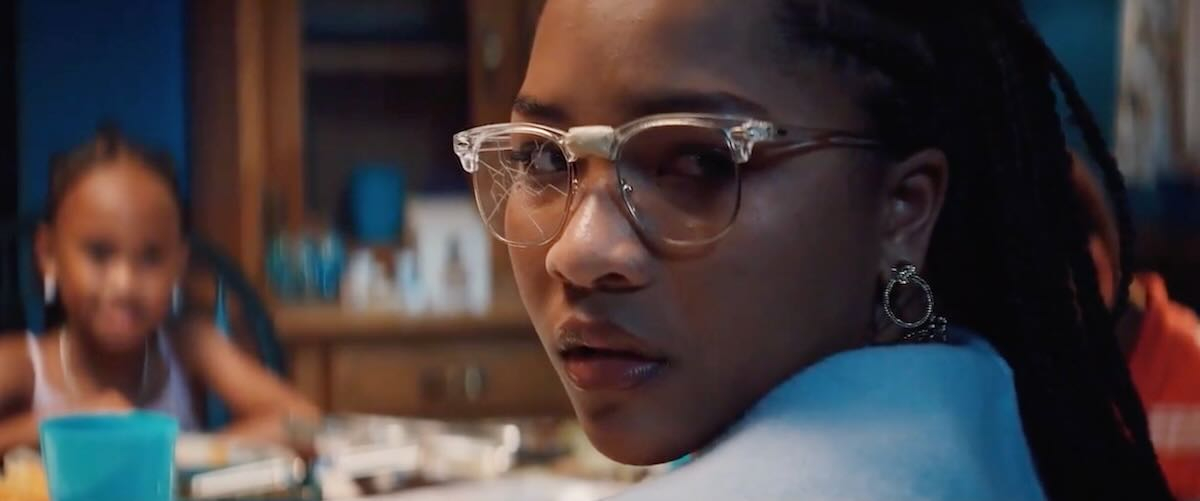
The Angry Black Girl and Her Monster is the too-literal title of a small film that deserves attention. Yes, there is an angry Black girl and yes, there is a monster, but the movie's undercurrents are what make it memorable. This film juggles big themes while delivering its quota of shocks and viscera.
The title carries a whiff of Blacksploitation. Its verbosity sets us up to expect a comedy. But to its credit, Angry Black Girl announces its seriousness upfront with a swooping Steadicam shot, and sinister electronic music to ease us into its setting, a suburban housing project.
In voiceover, a young woman intones that "death is a disease" and she aims to "cure" it. Her name is Vicaria and she is one of the few Black students in a "white school" where her hypotheses get her into trouble with her teacher. When not in school, she slips off to a garage warehouse that holds a terrible secret. You see, her mother and brother Chris were struck down separately by gangstas' bullets. Vicaria was too young to act with her mother but got to her brother's body before the police did. She dragged it to the warehouse where she conducts experiments that will bring him back to life.
The Angry Black Girl and Her Monster is the first effort by writer/director Bomani J. Story and is a "reimagining" of the Mary Shelley classic Frankenstein (Vicaria even has "Modern Prometheus," the book's subtitle, scrawled across her notebook cover). This project owes more to the Frankenstein movies than the novel, with its focus on the creator and its emphasis on the "they despise him because he’s a monster" riff.
Laya DeLeon Hayes (from CBS' The Equalizer) plays Vicaria with confidence and intelligence. She simmers, and her simple device of adjusting her broken eyeglasses works well. It's good to see Chad L. Coleman as Donald, her father, memorable for his turns in The Wire and The Walking Dead. His fiery defense of his daughter in a parent/teacher conference is clipped and powerful. Denzel Whitaker comes on strong as Kango, the drug kingpin. Young Amani Summer as Jada stands out as Vicaria's sidekick. Reilly Brooke Stith, Keith Holliday, Beth Felice, and Tracie Frank make an engaging ensemble of friends and family.
The streaming channel Shudder and Crypt TV helped produce it. While its opening in theaters, the film is better suited to the small screen. There, the limitations of its budget and its North Carolina housing project location, with its expansive lawns, are not so obvious. Mr. Story's director of photography Daphne Qin Wu and musical director Nima Fakhrara help him wring suspense from it.
Angry Black Girl is more successful as drama than horror. When The Angry Black Girl and Her Monster touches upon Black pride and family, its humanity shines through. Mr. Story renders those moments with skill and sincerity. His film is admirable, and most thoughtful when it shows the characters' ambivalence about their situation, which will play out ironically in the climax.
Aiesha: "What happens after death?"
Vicaria: "We get a second chance at life?"
Aiesha: "What's the point?"
For the most part, Mr. Story's ambitions play out pretty well as horror. But the genre is limiting, and too dependent on audience expectations. For example, an extended family dinner scene starts out nicely, with everyone relaxed and comfortable in character. But suddenly it's interrupted and subverted because, oh yeah, a scare has to happen…now. The genre requires it. Likewise, in the reanimation scene, sensitive, serious Vicaria is illogically reduced to Colin Clive-style cackling as she electrifies her monster. And the monster? The less said about him the better. He's a scrapheap of special effects of no real purpose, little more than a prop. Edem Atsu-Swanzy might be a fine actor but is buried under prosthetics and makeup.
As horror goes, The Angry Black Girl and Her Monster is serviceable. Shudder fans will be satisfied with its thrills and chills and carnage. But Mr. Story's strengths lie elsewhere. In the original Frankenstein, the creature was an allegory: by embodying death, Mary Shelley used him to shed light on what it meant to be alive. With his ear for dialogue and his way with actors, Mr. Story accomplishes some the same thing here, in a more modern context. He'd accomplish more if he wasn’t slipping on so much blood.
__________________________________________
The Angry Black Girl and Her Monster. Written and directed by Bomani J. Story. Produced by RLJE films, Shudder, and Allblk. 91 minutes. 2023. In theaters and on digital platforms.
